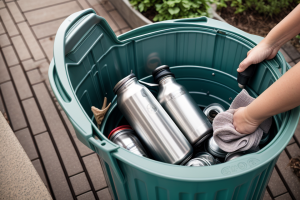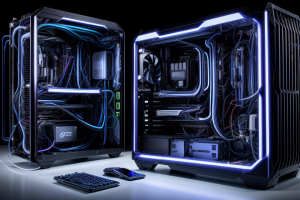
Are you tired of feeling like a walking oven during the hot summer months? Overheating can be a real drag, but luckily there are plenty of ways to beat the heat. From staying hydrated to finding the right clothing, there are many simple tips and strategies that can help you keep cool and comfortable. In this article, we’ll explore some of the best ways to prevent overheating and stay cool all summer long. So grab a glass of ice-cold water and get ready to learn some new tricks for beating the heat!
Understanding Overheating
Causes of Overheating
Overheating can occur due to a variety of reasons, some of which include:
- High ambient temperatures: This refers to the temperature of the environment. When the temperature outside is high, it can cause the body’s core temperature to rise, leading to overheating.
- Poor ventilation: When there is inadequate air circulation, the body may not be able to cool down properly. This can happen in closed or confined spaces, or during times of high humidity.
- Heavy physical activity: Engaging in strenuous exercise or physical labor can increase the body’s metabolic rate, causing it to produce more heat. This can lead to overheating, especially if proper cooling measures are not taken.
- Exposure to direct sunlight: The sun’s rays can cause the body’s temperature to rise, especially if there is no shade or protective clothing to shield the skin from the sun’s heat.
- Use of certain medications: Some medications, such as antihistamines, antidepressants, and certain types of painkillers, can affect the body’s ability to regulate its temperature, making it more susceptible to overheating.
It is important to understand the causes of overheating in order to take appropriate measures to prevent it.
Consequences of Overheating
Overheating can have serious consequences for your health and well-being. Some of the most common consequences of overheating include:
- Heat exhaustion: This is a milder form of heat-related illness that can occur when the body is unable to regulate its temperature properly. Symptoms of heat exhaustion can include heavy sweating, muscle cramps, headache, and fatigue. If left untreated, heat exhaustion can progress to heat stroke.
- Heat stroke: This is a more severe form of heat-related illness that can occur when the body’s temperature regulatory system fails. Symptoms of heat stroke can include high body temperature, confusion, seizures, and loss of consciousness. Heat stroke can be life-threatening if not treated promptly.
- Dehydration: Overheating can cause the body to lose fluids and electrolytes, leading to dehydration. Symptoms of dehydration can include dry mouth, dark urine, and dizziness. Dehydration can lead to more serious health problems if left untreated.
- Worsening of pre-existing medical conditions: Overheating can exacerbate certain medical conditions, such as heart disease, asthma, and diabetes. It is important for individuals with pre-existing medical conditions to take extra precautions to prevent overheating.
- Increased risk of accidents and injuries: Overheating can cause fatigue, dizziness, and confusion, which can increase the risk of accidents and injuries. It is important to take extra precautions to prevent accidents and injuries when the weather is hot.
Prevention Strategies
1. Stay Hydrated
Proper hydration is crucial for maintaining the body’s temperature regulation system. The human body loses water through sweat, and when this water is not replenished, it can lead to dehydration, which in turn can contribute to overheating.
Drinking plenty of water throughout the day is essential to prevent dehydration. Adequate water intake helps the body regulate its temperature and maintain the necessary functions to keep the body cool. Drinking water regularly also helps to flush out toxins from the body, which can contribute to overheating.
Avoid sugary drinks and caffeine as they can actually dehydrate the body, making it more susceptible to overheating. Sugary drinks contain high amounts of sugar, which can cause the body to release insulin, leading to increased urination and loss of electrolytes. Caffeine, on the other hand, is a diuretic, which increases urine production and can lead to dehydration.
It is also recommended to limit alcohol consumption as alcohol is a diuretic and can lead to dehydration. Alcohol can also affect the body’s ability to regulate its temperature, making it more susceptible to overheating.
In addition to drinking water, it is also important to consume electrolytes, especially during intense physical activity or in hot weather conditions. Electrolytes help to regulate the body’s fluid balance and can prevent dehydration.
Overall, staying hydrated is a crucial prevention strategy for overheating. Drinking plenty of water, avoiding sugary drinks and caffeine, and limiting alcohol consumption can help the body maintain its temperature regulation system and prevent overheating.
2. Dress Appropriately
When it comes to preventing overheating, what you wear can make a big difference. Here are some tips for dressing appropriately to keep cool:
Wear lightweight, loose-fitting clothing made of breathable fabrics
Clothing made of lightweight, breathable fabrics such as cotton, linen, and mesh can help keep you cool by allowing air to circulate around your body. Avoid wearing heavy, tight-fitting clothing as it can trap heat and make you feel hotter.
Choose colors that reflect the sun’s rays
Dark-colored clothing can absorb the sun’s rays and make you feel hotter, so it’s best to choose lighter colors that reflect the sun’s heat. White, beige, and pastel colors are good choices for hot weather.
Wear a wide-brimmed hat and sunglasses
A wide-brimmed hat and sunglasses can help protect your face and eyes from the sun’s intense rays, which can cause overheating. Hats with a brim of at least 2 inches can provide good sun protection. Look for hats made of lightweight, breathable materials like cotton or straw. Sunglasses with UV protection can also help keep your eyes cool and protected.
3. Seek Shade
- Take breaks in shaded areas: One effective way to prevent overheating is to take breaks in shaded areas. This can be especially helpful during peak hours of the sun, such as midday. Find a shaded spot under a tree, building, or awning, and take a break from the sun. This can help lower your body temperature and prevent heat exhaustion.
- Use an umbrella or parasol for protection from the sun: Another way to seek shade is by using an umbrella or parasol. This is especially useful when you’re in an open area with no natural shade. An umbrella or parasol can provide a personal shade that can protect you from the sun’s harmful rays. You can also use a sunshade on your car windshield to keep the interior cool while driving.
- Use sunscreen to protect your skin: It’s important to protect your skin from the sun’s harmful rays, especially during peak hours. Use a broad-spectrum sunscreen with an SPF of at least 30 to protect your skin from UVA and UVB rays. Reapply every two hours or more often if you’re swimming or sweating. Additionally, wear protective clothing such as long-sleeved shirts and pants to cover your skin and reduce the risk of sunburn.
4. Stay Cool Indoors
- Use air conditioning or a fan
- Central air conditioning systems are effective in cooling large areas of a home or building. They work by circulating cool air through a system of ducts, which can be directed to different rooms or areas as needed.
- Window air conditioners are a popular choice for cooling individual rooms or areas. They work by pulling hot air from the room and expelling it outside, while also circulating cool air back into the room.
- Portable fans are a cost-effective and energy-efficient way to stay cool indoors. They work by circulating air around the room, creating a cooling effect.
- Close windows and use room darkening shades to keep the room cool
- Keeping windows closed can help prevent hot air from outside from entering the room. This is especially important during the hottest parts of the day, when the sun is shining and temperatures are highest.
- Room darkening shades can help block out the sun’s rays, which can help keep the room cooler. They can also help reduce glare and make it easier to sleep or relax.
- Use cool gel or buckwheat pillows
- Cool gel pillows are filled with a gel that stays cool to the touch, even when the pillow is warm. This can help keep the head and neck cool during hot weather.
- Buckwheat pillows are filled with small, lightweight pieces of buckwheat husk. They are often used as a natural alternative to traditional pillows, and can be a good choice for people who prefer an eco-friendly option. Buckwheat pillows are also a good choice for people who suffer from allergies or asthma, as they are hypoallergenic and dust mite resistant.
5. Manage Your Environment
When it comes to preventing overheating, managing your environment is crucial. Here are some tips to help you keep your surroundings cool:
Keep windows open to allow for cross ventilation
One of the simplest ways to keep your home cool is by opening windows to allow for cross ventilation. This means opening windows on opposite sides of the room to create a breeze. It’s important to note that this method may not be effective in all climates, especially during extreme heat waves.
Use curtains or blinds to block out the sun
During the summer months, the sun can heat up your home and make it difficult to stay cool. To prevent this, consider using curtains or blinds to block out the sun’s rays. This can help keep your home cooler by reducing the amount of heat that enters through the windows.
Use a dehumidifier to reduce humidity levels
High humidity levels can make it feel hotter than it actually is, which can be uncomfortable and even dangerous for some individuals. To reduce humidity levels, consider using a dehumidifier. This appliance works by drawing in moisture from the air and removing it, leaving your home feeling cooler and more comfortable.
Overall, managing your environment is an important part of preventing overheating. By taking steps to keep your home cool, you can reduce your risk of heat-related illnesses and enjoy a more comfortable living space.
6. Plan Ahead
- Schedule outdoor activities for cooler parts of the day: One effective way to prevent overheating is to plan outdoor activities during the cooler parts of the day. For example, if you are planning a hike, consider starting early in the morning or later in the evening when the sun is not as intense. This can help you avoid the peak heat hours when the sun is at its strongest, reducing the risk of overheating and dehydration.
- Prepare for outdoor activities by wearing appropriate clothing and using sunscreen: When engaging in outdoor activities, it is important to dress appropriately and use sunscreen to protect yourself from the sun’s harmful rays. Wear lightweight, loose-fitting clothing made of breathable fabrics such as cotton or moisture-wicking materials to keep you cool and comfortable. Additionally, apply sunscreen with a high SPF to protect your skin from the sun’s ultraviolet rays, which can cause sunburn and increase your risk of overheating.
- Avoid strenuous activities during peak heat hours: During peak heat hours, it is best to avoid strenuous activities that can cause your body to overheat more quickly. Instead, opt for lighter activities such as a leisurely walk or yoga, which can still provide physical benefits without putting too much strain on your body. If you must engage in strenuous activities during peak heat hours, take frequent breaks to rest and hydrate, and try to schedule them in the early morning or later in the evening when the sun is not as intense.
7. Be Mindful of Medications
- Consult with a healthcare provider about medications that may increase sensitivity to heat
- Avoid taking certain medications during peak heat hours
- Be aware of potential side effects of medications and how they may affect your ability to regulate your body temperature
It is important to be mindful of medications when it comes to preventing overheating. Some medications can increase sensitivity to heat, making it more difficult for the body to regulate its temperature. Before taking any medication, it is advisable to consult with a healthcare provider to determine if it has the potential to cause this increased sensitivity.
Additionally, it is important to avoid taking certain medications during peak heat hours, as they may exacerbate the risk of overheating. It is also important to be aware of potential side effects of medications and how they may affect your ability to regulate your body temperature.
In some cases, medications may cause dehydration or reduce the ability of the body to sweat, which can increase the risk of overheating. Therefore, it is important to read the medication’s side effects and instructions carefully and consult with a healthcare provider if there are any concerns.
Overall, being mindful of medications is an important prevention strategy for keeping cool and avoiding overheating.
8. Be Prepared for Emergencies
Overheating can quickly become a life-threatening situation, especially during extreme heat waves or prolonged exposure to the sun. Being prepared for emergencies is essential to ensure that you can respond quickly and effectively to prevent serious health consequences. Here are some tips to help you be prepared for emergencies related to overheating:
- Know the signs of heat exhaustion and heat stroke: Heat exhaustion is a milder form of heat-related illness that can occur when the body loses excessive amounts of water and electrolytes through sweating. Symptoms include headache, dizziness, nausea, muscle cramps, and fatigue. Heat stroke, on the other hand, is a more severe condition that occurs when the body’s temperature regulation system fails, leading to a high body temperature and potentially life-threatening complications. Symptoms include confusion, seizures, loss of consciousness, and extremely high body temperature. It is crucial to recognize the signs of these conditions and seek medical attention promptly.
- Have a plan for seeking medical attention if necessary: If you experience symptoms of heat exhaustion or heat stroke, it is essential to seek medical attention immediately. Have a plan in place for how to get to a medical facility or call emergency services if necessary.
- Have a cooling off plan in case of emergency: If you experience a heat-related illness, it is crucial to cool off the body as quickly as possible. Have a plan in place for how to cool off, such as taking a cool shower or bath, sitting in front of a fan, or using a cooling towel.
- Know the location of the nearest hospital or emergency services: Knowing the location of the nearest hospital or emergency services can save valuable time in case of a heat-related emergency. Check ahead of time and have this information readily available in case of an emergency.
By being prepared for emergencies related to overheating, you can take quick action to prevent serious health consequences.
9. Take Care of Others
- Check on elderly or disabled individuals during periods of extreme heat
- Make sure they have access to air conditioning or a cooling system
- Encourage them to stay hydrated by providing cool water or electrolyte-rich beverages
- Check on their well-being regularly and be alert for signs of heat exhaustion or heat stroke
- Provide adequate water and shelter for pets and animals
- Keep pets indoors in a cool, shaded area with access to water
- Provide plenty of fresh water for outdoor animals and refill their water bowls regularly
- Ensure that animals have access to shelter, such as a shaded area or a cool, ventilated structure
- Check on neighbors and friends who may be at risk of overheating
- Be proactive in reaching out to those who may be vulnerable to heat-related illnesses
- Offer to check on them regularly and make sure they have access to cooling systems and plenty of water
- Encourage them to stay inside during the hottest parts of the day and to seek medical attention if they experience symptoms of heat-related illnesses
10. Be Prepared for Power Outages
Having a Backup Cooling System
One of the most important things to do when preparing for power outages is to have a backup cooling system. This can be in the form of a portable air conditioner, a fan, or even a simple bucket filled with ice and placed in front of an open window. Having a backup cooling system can help keep your home cool and comfortable during power outages, and can prevent overheating.
Keeping a Supply of Ice or Frozen Gel Packs
Another way to prepare for power outages is to keep a supply of ice or frozen gel packs in the freezer. These can be used to cool down the body and to keep food and drinks cool during power outages. It is important to note that these should be kept in a safe place where they will not be damaged during the power outage.
Having a Plan for Alternative Methods of Communication
Having a plan for alternative methods of communication in case of power outages is also important. This can include having a battery-powered radio, a charged phone, or even a walkie-talkie. Having a way to communicate with others can help you stay informed and connected during power outages, and can help prevent overheating.
FAQs
1. What are some common causes of overheating?
There are several reasons why a person may experience overheating. Some common causes include being in a hot environment, exercising, wearing too many layers of clothing, and being dehydrated. Certain medications and medical conditions can also contribute to overheating.
2. What are some tips for preventing overheating?
To prevent overheating, it’s important to stay hydrated by drinking plenty of water and avoiding alcohol and caffeine. Wearing loose, breathable clothing made of natural fabrics can also help. Avoiding being in direct sunlight or in hot environments for extended periods of time can also help. Taking frequent breaks to cool down and rest in a shaded or air-conditioned area can also be helpful.
3. What are some strategies for cooling down when overheating occurs?
There are several strategies for cooling down when overheating occurs. Taking a cool shower or bath, sipping cold drinks, and applying a cold compress to the neck or wrists can help. Moving to a cooler environment, sitting in front of a fan, or using a cooling pad can also be helpful. In severe cases, it may be necessary to seek medical attention.
4. How can I manage overheating while exercising?
To manage overheating while exercising, it’s important to wear lightweight, breathable clothing and stay hydrated. Pacing yourself and taking frequent breaks to rest and cool down can also be helpful. If you’re participating in a hot weather sport, consider using a cooling spray or towel to help keep cool.
5. Is there anything I should avoid doing if I’m experiencing overheating?
Yes, there are several things you should avoid doing if you’re experiencing overheating. Avoiding drinking alcohol or caffeine, staying in direct sunlight or in hot environments for extended periods of time, and wearing too many layers of clothing can all worsen overheating. Taking hot showers or baths should also be avoided as they can cause your body temperature to rise further.







